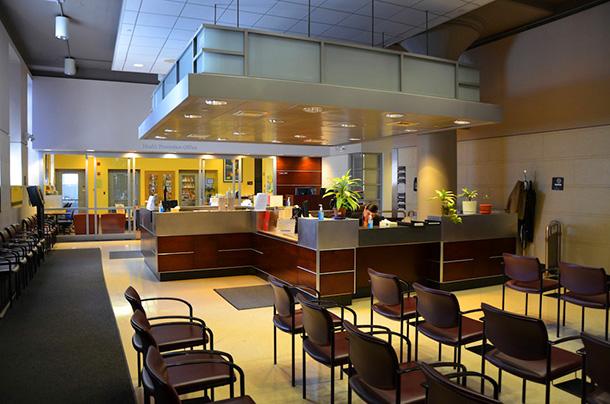One Dietician for 50,000 Students
There is only one dietician for the 50,000 students at NYU. This brings concerns, especially since treatment for disordered eating habits is necessary given its prevalence.
April 3, 2017
If one of the 50,000 students at NYU seeks the attention of a dietician at the Student Health Center, they must wait between two weeks and one month for nutritional services due to limited staff — there is only one registered dietician available.
Student Health Center dietician Laura Bennett is responsible for treating students with eating disorders, medical conditions, weight control problems and those adapting to vegetarian or vegan lifestyles. Ryan Turner is available as a part-time nutritionist only for varsity athletes at NYU, and his main focus is to use nutrition to optimize performance and prevent injury. Psychotherapists are available for additional eating disorder treatment and provide services through NYU Langone Hospital in severe cases — typically characterized by a dangerously low weight.
Despite the availability of only one dietician, a Tandon freshman who spoke with WSN on the condition of anonymity to protect her identiy said that the SHC’s dietician services have been extremely constructive for treating her eating disorder. However, she said that the slow turnover for booking appointments is concerning.
“At any given time, she is booked for a month out,” the student said. “We have over 50,000 people attending NYU, many of whom likely have disordered eating habits. It’s irresponsible for NYU to be ill-prepared to address an epidemic that primarily affects their students.”
She said that when her counselor initially mentioned seeing a nutritionist as an option for coping with her disordered eating habits, she jumped at the opportunity to make a positive change in a behavior that she felt had persisted too long.
“I hoped to see the nutritionist promptly, but when I tried to schedule an appointment, she was booked for weeks solid — I had to wait about a month for an appointment,” the student said. “I understand she’s in high demand, because, first, nutrition issues are heavily prevalent, and second, because she offers wonderful treatment options. But I just feel like the Student Health Center could do more for its patrons if they expanded their nutrition services.”
Langone doctor and Department of Child and Adolescent Psychiatry professor Kathryn Cheney said that eating disorders are caused by an imbalance of hormones and neurotransmitters. This imbalance can be induced by a period of emotional stress that is common among college students.
“I think the really important thing that comes along with eating disorders is the amount of shame and guilt associated with it,” Cheney said. “And so it’s really important to be supportive. It’s hard. It’s very hard.”
Women between the ages of 18 and 24 are most vulnerable for the onset of an eating disorder, and Bennett said that 25 to 40 percent of college women have a diagnosable eating disorder at some point in their college career. She said the demand for services is high, but the Student Health Center supports her efforts successfully.
“Eating disorders are serious mental illnesses, and when very strong and severe, I may refer students for high levels of care,” Bennett said. “This is a joint decision, however, and I help them find the best option to meet their treatment needs. Nutrition therapy can be challenging but also helpful in an effort to team with the person struggling and overcome their eating disorder. I work with students toward eating mindfully and eventually intuitively.”
Bennett said that although a number of universities employ multiple registered dietitians, others don’t employ any. Therefore, she is grateful that NYU respects the need for a dietician and allows her to continue her services.
Steinhardt senior Priya Solanki, who was involved in planning National Eating Disorder Awareness Week events at NYU from 2014 to 2016, believes that eating disorders are not given enough attention at the Student Health Center.
“I think that especially with eating disorders, they haven’t placed any specific attention to [them],” Solanki said. “I feel like a lot of people who have an eating disorder feel left out of the facilities and resources that we do have available.”
A version of this article appeared in the Monday, April 3 print edition. Email Caroline Haskins at [email protected].



























































































































































